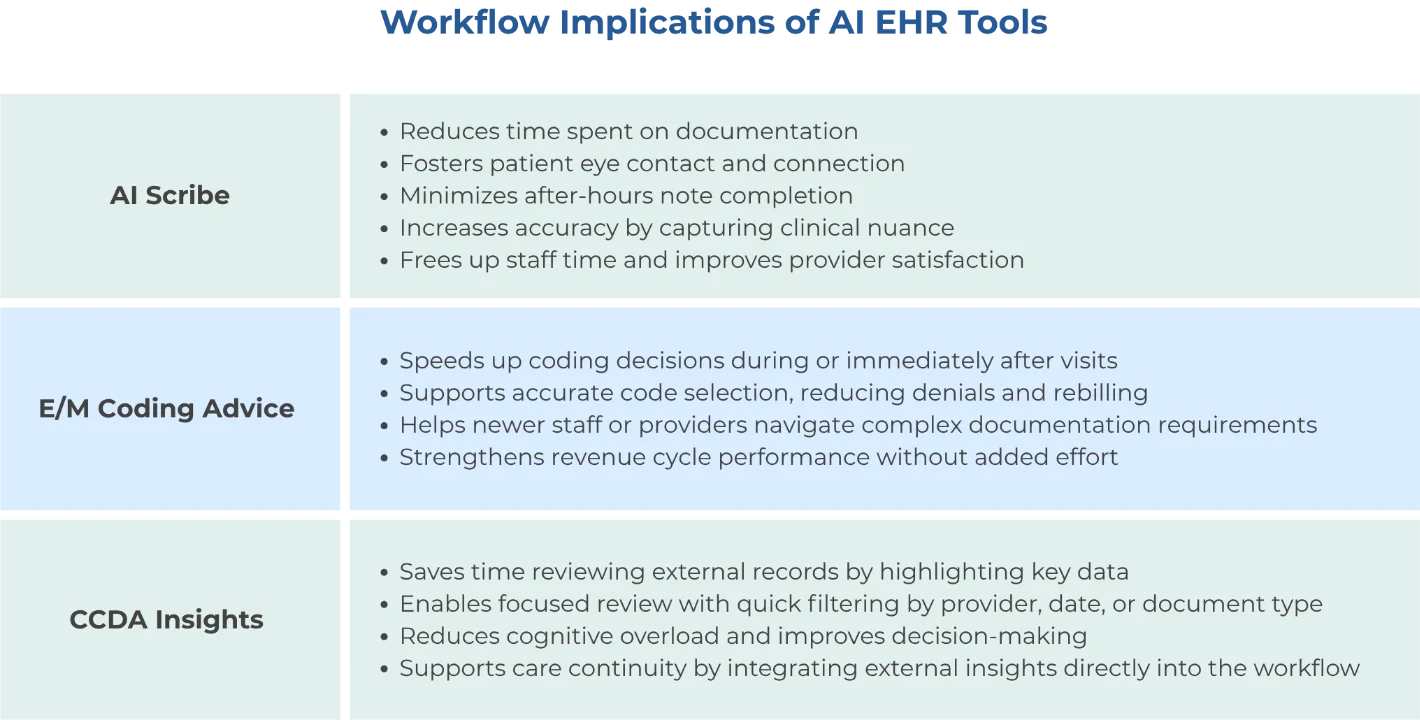Key Takeaways
- AI in surgical practice management helps automate scheduling, billing, and documentation tasks.
- Smart tools reduce administrative burden and prevent staff burnout.
- AI surgical software supports faster decision-making and better resource planning.
- Discover secrets to switching to an AI-enabled EHR.
Surgical practices demand precise coordination, rapid decisions, and seamless documentation—all under intense clinical pressure. It’s key that processes supporting procedures uphold accurate documentation and meet compliance standards. Frequent referrals make interoperability essential, rendering a modern, integrated system key to success. When a surgical practice relies on outdated or disconnected tools, even routine tasks can create frustrating bottlenecks.
A powerful and possibly untapped solution is introducing—or optimizing—AI for doctors performing surgery.
From streamlining patient scheduling to reducing coding errors and optimizing workflows, AI-enhanced surgical software is helping practices reclaim time, reduce costs, and create smoother operating environments. Whether you manage an outpatient center or work in a busy multi-specialty group, the right technology can support every level of your practice.
Table of Contents
Surgical Practices Need More Than Scheduling Tools
Most legacy EHRs and scheduling tools were not designed for the fast-paced, procedure-driven nature of surgical environments. As a result, staff relying on these systems spend too much time toggling between screens, reentering data, and cleaning up avoidable errors in billing.
AI-driven platforms solve for this by automating:
- Operating room and block scheduling
- Pre- and post-op documentation workflows
- Procedure code validation
- Real-time eligibility and authorization checks
With AI handling these tasks in the background, surgical teams can focus on patients, not paperwork.
Faster Decisions, Better Use of Resources With AI
In a fast-moving environment, having access to important details is crucial for clinical excellence, patient outcomes, and optimizing revenue. For those hesitant to adopt modern tech, AI tools aren’t a clinical replacement, but an enhancement. In surgical practice management, features can surface relevant information at the right moment, helping providers navigate charts and support better pre-op planning.
Examples include:
- Predictive analytics that flag patient risks and optimize scheduling.
- Interactive dashboards visualizing case loads and resource use.
- Adaptive documentation prompts based on patient history.
The benefit? Fewer delays, faster charting, and clearer insight into how your practice is performing operationally and clinically.
Reducing Burnout by Automating Repetitive Work
It’s no secret. Surgeons and support staff alike face documentation fatigue, especially when juggling pre-op notes, referrals, consents, prior authorizations, and billing codes across multiple platforms. AI EHR tools are changing the way practices interact with information every day.
AI surgical software helps reduce administrative burdens by:
- Generating structured note templates pre-filled with patient data.
- Auto-suggesting CPT and ICD-10 codes based on documentation.
- Sending alerts when required fields or follow-ups are missing.
With automation taking care of the busywork, your team can spend less time clicking—and more time caring for patients.

Better Billing, Fewer Denials
With a strong revenue cycle, your practice is better protected against revenue fluctuations. Still, surgical billing is complex, and even small errors can result in costly delays or denials. AI for doctors can be a valuable assistant, catching issues in real time and supporting clean claims from the start.
AI billing features include:
- Pre-submission claim checks that identify errors or mismatches.
- Coding assistant tools that learn from documentation patterns and payer history.
- Analytics dashboards that highlight aging claims and reimbursement gaps.
Adopting modern, AI-driven tools now means your practice is positioned to stay financially healthy while reducing rework for your billing team.
Operating With Confidence Through Smart Tech
As your surgical practice grows—whether through added providers, new procedures, or more locations—your tech should grow with you. Cloud-based, AI-enabled systems make this possible without the burden of heavy IT infrastructure or long transition times.
AI in surgical practice management supports:
- Seamless onboarding of new team members with role-based workflows.
- Easy access to real-time data across locations.
- Configurable templates and scheduling logic based on your specialty and staffing model.
With these capabilities, scaling becomes more strategic and less stressful.
Don’t Let Old Systems Hold Your Surgical Team Back
In surgical practice management, every second counts and every detail matters. Outdated systems slow you down, increase risk, and drain your team’s time and energy. By embracing AI-driven tools built specifically for surgical workflows, your practice can move beyond the limitations of manual processes and disconnected systems.
AI is the future of surgical practice management, and it’s how forward-thinking practices are operating today, with greater precision, confidence, and control.











